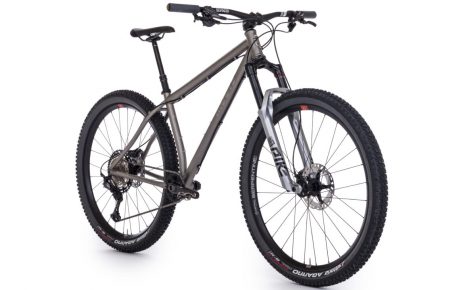Cannabis has long been a fringe appurtenance to mountain biking – Missy Giove got busted back in the day for having 350 pounds of the stuff, Sick Bicycles make a titanium bong, and athletes like Steve Peat casually joke about it in interviews.
One of its biggest advocates for CBD is Alex Mountain. Alex was a personal trainer before struggles with his business and personal life left him stressed and starting to notice he couldn’t move his wrists very well. Before long his friends started calling him ‘Glassboy’ and he was spending most of his time in a cast. He remembers, “The first thing I noticed was I couldn’t do a press up, I couldn’t hold my own body weight up. How was I going to throw myself down a hill, get myself round a set of jumps with the aches and pains I had?” He was diagnosed with rheumatoid arthritis and prescribed naproxen but it gave him stomach ulcers and before long he was back in hospital again.
It was another few months before he found a medication that worked. He says, “I ended up consuming CBD in the raw form that you can purchase in certain dark spots and it started to help instantly. So I started once a week consuming quite a lot of the raw material in order to help with the weak saturation of my joints.”
Since then he’s started CBD Mountain, a business selling CBD aimed at mountain bikers and other high-impact athletes. He’s formulated a product he claims contains zero THC that is currently being used by riders in the UK and even Paralympians.
So what is it and how does it work? CBD is one of the active cannabinoid compounds in the cannabis plant but it crucially doesn’t have the psychoactive effects of the other main component, THC. Cannabinoids are naturally occurring and, it may not surprise you to know, particularly prevalent in cannabis. CBD-rich strains of hemp can be selectively bred to produce the highest yield of CBD with minimal amounts of THC and these are harvested for CBD products.
Cannabinoids work with the endocannabinoid system, a modulator of the immune system. One of the functions of the immune system is to boost muscle recovery from injury or exercise. Trace the steps backwards and CBD will supposedly help with recovery as well as general immune health. The theory goes it will mean you feel fresher after riding and reduce your time off the bike with injuries. There are other claimed benefits on top of this – improved sleep, reduced anxiety, diabetes prevention, the list goes on.
In the past 12 months CBD has become a marketer’s dream. The number of UK users doubled last year and and it is now possible to buy CBD oil infused products as varied as skincare, beers and marshmallows. There are even rumours that Coca Cola want to release a CBD drink with Canada’s Aurora Cannabis.
What do the riders think?
Kyle Jameson has arthritis from trail building and knee pain from a bad injury three years ago. He says, “I was in tons of pain and the pills that were prescribed to me made me feel like shit and I wasn’t eating. Cannabis products were able to take the pain away, help me sleep and I didn’t lose my appetite.”
“I use both THC and CBD for pain relief, CBD is my main focus but to get the full effect for CBD you need a small amount of THC. I do notice a difference, my joints flare up after a ride, especially my knee.”
“I’ll load up on some CBD topical creams on those specific areas before and after to keep the swelling down and then if I’m in a lot of pain I’ll have some kind of light THC/CBD oil or gummy and night to help me sleep. Of course I stretch and try and eat well, without those you aren’t healing anything.”
In fact, KJ is such a big advocate for using cannabis he has picked up a sponsorship from Oregrown, a controversial cannabis company that also support KJ’s Black Sage FEST.
Beccy Booth, one half of Fat Creations, has suffered from daily neuralgic headaches for seven years following an accident that gave her major whiplash, severe concussion and multiple facial injuries. She uses CBD Mountain and says, “Pre-CBD, my absolute limit without being in horrendous pain would be to run six miles, since taking CBD I have done several 10 mile off road trail runs and I don’t have nasty side effects of prescription drugs hindering my riding. I feel more alert and less tired as I’m in less pain and sleeping better. The only side effect I have noticed is an increased feeling of happiness, others have noticed that in me too. My mood has improved a lot.”
Rob Welch, who chronicled his return from injury in the recent Live to Ride edit, has only been using CBD for two weeks but he has already noticed reduced pain after riding. He also said it was helping him sleep as his knee often hurt and was keeping him up at night.
Not everyone is so convinced. Olly Wilkins said: “I suffer from gnarly arthritis in my ankle and took different forms of CBD in the hope it would alleviate some of the pain. I gotta be honest, I found zero change in anything. It’s not to say it doesn’t work. Maybe I was hoping for too much? I take endless supplements and never notice anything works for pain. If it works for you then it works but I would probably say it’s largely a placebo from my own experience.”
A lot of riders declined to be involved in this piece altogether. It’s easy to see why, the association with cannabis is still off putting and could be a serious conflict for riders’ other sponsors. In January, the Supercross world was aflame with a CBD controversy as social media egomaniac Dan Bilzerian sponsored Dean Wilson, who is running this year as a privateer, through his CBD company Ignite. The mire thickened at Anaheim where NBC Sports requested Wilson cover any Ignite logos on his race kit as it had not yet been federally approved. Wilson had to comply or risk not racing, unleashing a social media backlash. It’s a controversy that’s likely to continue through the season.
It’s worth looking at the science at this point. The endocannabinoid system was only discovered in 1992 and there are still plenty of gaps in the the scientific understanding of it. A 2018 literature review titled Cannabis and the Health and Performance of the Elite Athlete (Ware et al.) describes the paradox of cannabis and sport, saying, “Despite evidence that recreational cannabis use may impair psychomotor skills and cognitive function, there is a perception among some athletes that cannabis use may have beneficial effects. The illegal or prohibited status of cannabis worldwide has limited our ability to generate high-quality data on the patterns and prevalence of cannabis use among elite athletes.”
The literature review could only conclude, “there is no evidence of performance-enhancing or causal effects’, while also admitting that more work needs to be done. All of this isn’t to say CBD has no benefits for athletes, more there isn’t any evidence yet that it does.
But then, a lot of things that elite athletes take aren’t fully understood – most supplements are ‘clinically researched’ as opposed to ‘scientifically proven’ to work but the power of testimonies has meant that you’re very unlikely to find an elite athlete that now doesn’t take them, accepting all the risks that come along with it.
That’s another problem for the CBD market too. A study in November 2017, led by Marcel Bonn Miller, Labeling Accuracy of Cannabidiol Extracts Sold Online analysed 84 CBD products and found 26 per cent contained less CBD than labeled while 43 per cent contained more than labeled. More worrying than this though, the products contained on average one per cent THC, which the study notes “may be sufficient to produce intoxication or impairment, especially among children” and will, crucially, get you popped on a doping test.
Chris Kilmurray, coach of Tahnee Seagrave, Greg Callaghan and more, warns about the dangers of the “cult” of CBD. He said that although none of his athletes are currently taking it, they are certainly discussing the benefits and effects. He said, “Like any medical product or supplement, it needs to be evidence backed. Using it for “general good” may not actually be the best way to maximise its benefit and may indeed be a waste of money.
“If you are a professional athlete then taking CBD in competition is a risk. It comes from the same plant as THC so the risk for contamination is ever present. Regular use may also blunt the cell signalling that leads to adaptation to training. Essentially meaning you get ‘less fit’ from the same training dose. That is another area that needs to be monitored and thought about by riders and athletes,” says Kilmurray.
“All we need is less hype and more evidence! If CBD does prove to be a wonder drug than that may mean you are behind the curve, but better safe than sorry in this regard in my opinion.”
With CBD only being properly available to athletes for a year and yet to be properly regulated, it’s clear there is lots more to learn. However, athletes look for any legal advantage they can get and the many positive reports surrounding CBD will be hard to ignore.
Alex Mountain sees it as the start of the revolution. He says, “The industry, I hope, will go down the route of replacing opiate based medication.”
So, snake oil? Wonder supplement? A foil to energy drinks? Is the future green? Time will tell.



